When we think of helping others in need in our community, it’s natural to picture direct, practical actions, such as providing food, building houses, donating warm coats or mentoring young people. As Mother Teresa famously said, “Help one person at a time and always start with the person nearest you.”
That notion was challenged, however, at the United Way of Asheville & Buncombe County’s 20th annual legislative briefing, held Dec. 8 on the UNC Asheville campus. Speakers argued for an increased focus on lobbying and advocacy to help shape policies affecting thousands who are in need.
Addressing a crowd of almost 150 nonprofit staff members, directors, volunteers and elected officials — including state Reps. Brian Turner and John Ager and Asheville City Council members Gordon Smith and Gwen Wisler — local philanthropist Jennie Eblen urged service providers to expand their focus beyond the direct services. “Do you have the awareness that your direct service will never likely be enough to fully address the complexity and the scale of the challenges in our community?” Eblen asked.
Direct services alone, she stressed, are only a part of nonprofits’ role: “If we look upstream — at the conditions and the policies that underlie the issues — that might be the solution.”
Advocacy, Eblen went on, can bridge the gap between the services nonprofits provide and the needs that far exceed nonprofits’ resources. “Not only can we do public policy advocacy, we should,” she urged.
Strategies for advocacy
Addressing those he called the “smart, intelligent and beautiful people who are part of this movement trying to make our community a better place, a more resilient place to be,” Greg Borom, director of advocacy for Children First/Communities in Schools, offered practical strategies for public policy advocacy.
“People in our sector tend to have a perception that nonprofits can’t lobby,” Borom said. That’s not true, he continued, but there are rules around what nonprofits must do to preserve their special status. “The big thing you need to remember is that those groups can never ever, never never ever, endorse or oppose political candidates or political parties,” he explained.
As values- and issues-oriented organizations, however, nonprofits can and should speak about issues in both election years and nonelection years, Borom said. He also urged nonprofits to support voter registration as well as other efforts to increase political participation among the communities nonprofits serve.
Nonprofits are required to file paperwork to disclose funds they spend on advocacy; Borom suggested that attendees consult the website of the N.C. Center for Nonprofits for more detailed information and guidance. He called that organization’s director of public policy and advocacy, David Heinen, a “real guru” on the subject of rules governing nonprofit advocacy spending and recommended that attendees use Heinen as a resource if they have specific questions on the topic.
Borom advised nonprofits to create a plan for devoting organizational resources to advocacy and for determining which issues to focus on. Having a plan helps nonprofits develop strong, unified and effective communications to policymakers and those who influence them. And it avoids the shock of seeing a staff member or volunteer “on the front page of the newspaper about some issue you didn’t know they’d be speaking about,” Borom said.
“Make it a team effort,” he concluded, “so that you can all embrace it and get behind it. Because when we do that as a nonprofit, we can have a powerful voice.”
Report from Raleigh
Annaliese Dolph, registered lobbyist for the United Way of North Carolina, outlined the current legislative landscape in Raleigh for issues of concern to nonprofits.
As North Carolina’s economy continues to strengthen, Dolph reported, “there’s a question of what we’re going to do with those increasing revenues.”
Philosophies differ between the two state legislative bodies: “The Senate has a very austere approach and would like to put a lot of money into savings while ratcheting down our spending, while the House is interested in starting to reinvest in some of the infrastructure, education and health programs,” said Dolph.
That tension will continue to influence the policymaking dynamic in Raleigh, Dolph predicted.
Ron Katz, director of the community fund for the United Way of Asheville & Buncombe County, said after the meeting that his organization encourages a “nonpartisan approach based on working cooperatively with elected officials.” Katz also pointed out that the meeting had been broadcast via video live streaming to allow partners across the region to access the briefing as it happened.
“The United Way is a strong believer in democracy. For the democratic process to work for everyone, people on all levels must participate. Our role is to support individuals and other organizations as they advocate for their issues and passions.”
- Rep. John Ager speaks with attendee at United Way legislative briefing
- Ron Katz, Director of Community Fund for United Way of Asheville Buncombe County
- Greg Borom of Children First/Communities in Schools addresses the crowd
- Jenny Eblen talks about the importance of nonprofit advocacy
- Ted Fitzgerald of the N.C. Board of Elections explains 2016 Voter ID requirements
- United Way of N.C. registered lobbyist Annaliese Dolph briefs crowd on outcome of 2015 lobbying and 2016 issues



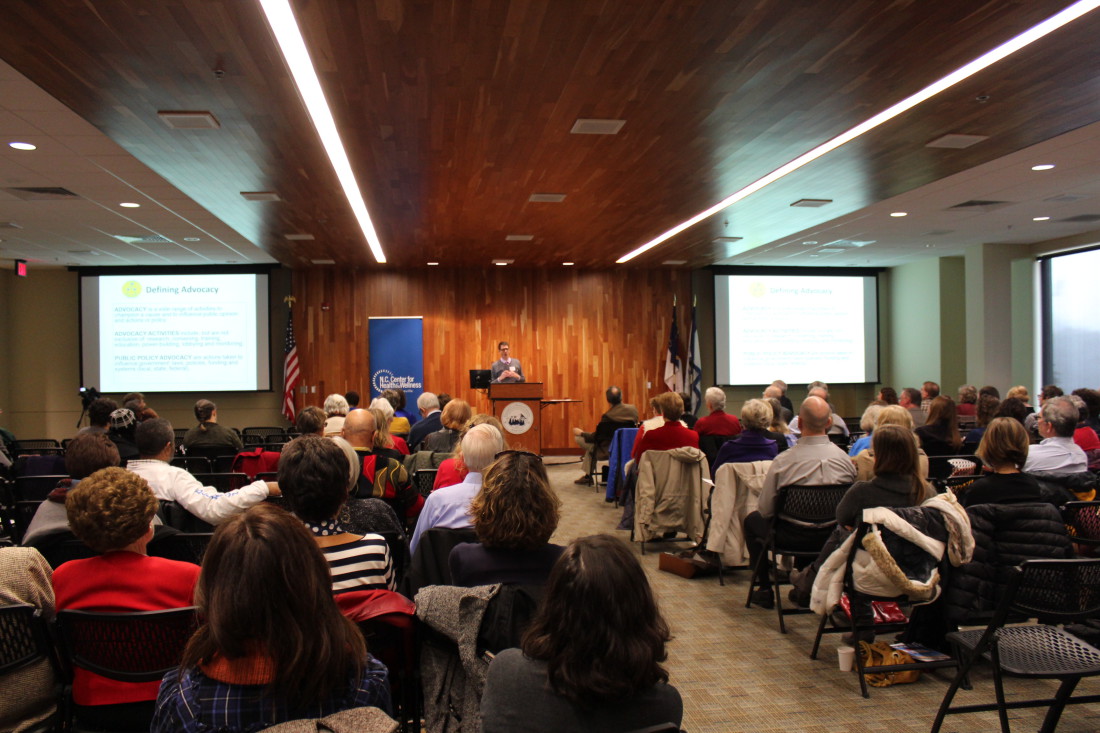

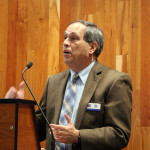
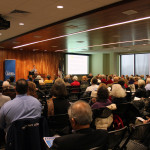

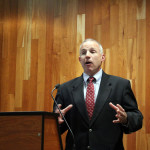
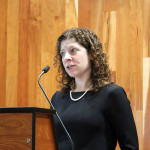
This is ridiculous, non-profits by the very nature of their 501(c)(3) status can’t lobby…
This comes directly from the IRS website: “In general, no organization may qualify for section 501(c)(3) status if a substantial part of its activities is attempting to influence legislation (commonly known as lobbying). A 501(c)(3) organization may engage in some lobbying, but too much lobbying activity risks loss of tax-exempt status.”
How about we just elect reasonable, nonpartisan people to office instead of asking already overburdened nonprofits to become lobbyists!?!?!
Actually 501(c)(3) organizations can lobby. It just can’t be what they primarily do. For example, being an advocate for children and families is explicitly part of the purpose of Henderson County’s Children & Family Resource Center. Many environmental organizations are also 501(c)(3) organization as are land trusts. All of them lobby to some extent.
LOL, you don’t seem to understand that those in the non-profits and the local council and various “boards” are all intertwined with each other lulz. It’s like one big party of thieves with loudmouth Bothwell always there to claim that legislation in Raleigh is the cause of property tax hikes locally LOL. Non-profits like our little tourist industry that pay themselves fat cat wages and do nothing except for anyone that lives here except raise the cost of living and overload the infrastructure. But they don’t care because if they don’t get paid by room taxes, they’ll just pay themselves via property taxes lulz.
LOL, progressive is just another term for dumb and believe me when I say that Asheville is full of dumb people lulz.
they are awfully clubby and cliquey, and seem to be determined to underhandedly create their own housing crisis with the UDO so they can get credit for trying and failing to solve the problems they created themselves. Asheville regulates until they can’t possibly build their own homes and then must kneel to the city which builds a few homes for some of them.
Agreed. We all know where dollars come from. Finding ways for people to get off OFF the system, such as helping people get jobs, would be a better way to spend time. All this shouting in the guise of advocacy is divisive.
FEAR the United Way!
They have infiltrated many large corporations and institutions (including Buncombe’s largest, Mission Hospitals) who then present the United Way campaign as mandatory (i.e. you don’t have to donate, but you do have to participate).
I suspect it is only a matter of time until participation AND donation will become a yardstick by which job performance is measured.
I know that Habitat for Humanity seriously needs to oppose the zoning which so restricts and limits their own housing construction, and that this is something Brian Haynes is seriously failing to do and in fact incredibly does the opposite and tries to further regulate and hinder construction, which will inevitably hinder Habitat.
http://www.projectprevention.org/ This charity just might save the world without help from government; though the ones at the conference never will.